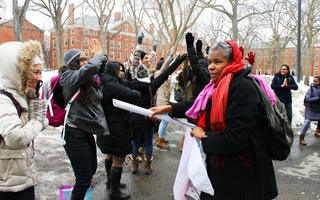Querida Familia,
To our brothers and sisters on campus. To our mothers and fathers back home. To every person who has taught us what our Latinidad is supposed to be. Who we are is a result of what you’ve instilled in us. The strength, resilience, and compassion that nuestra historia, has gifted you, you’ve in turn given to us. Your stories, struggles, joys, and sorrows seep into our skin, our soul, and our Latinx identity–creating Latinidad.
This Latinidad is protection against a cold world. It is the warmth we find in our families. It is laughter over food made by our Abuelitas and Tías, over pupusas revueltas and tamales de puerco. It is the cousins we grew up with, who felt more like siblings. The parties that never seem to end, brought to life by ever-present family and loud music, to create a community that we can’t imagine living without. The phone calls back to El Salvador, or México, or Nicaragua, or Honduras, reminding us that we are American, but hyphenated. Our biculturalism is our strength, and it informs our view of the world in a fuller way. We take our experiences, our families, and our Latinidad and wield it when we seek our inclusion in institutions and countries we love.
On our campus, Latinidad is assumed to mean low-income, first-generation, and adorned with light brown skin. Constantly bombarded by this seemingly quintessential Latinx student laughing on the cover of pamphlets, a smiling light brown face surrounded by other students of color, we internalize its stereotypical stock image of Latinidad as reality. In turn, we forget that Latinidad is more than a just a short checklist of characteristics someone should possess. It is more than any one of our personal narratives.
For some of us, being Latino means embracing machismo and hypermasculinity. It means beating our women and glorifying emotional unavailability. For others, being Latina relies on beauty standards that cling to deep rooted seeds of racism and glorify white skin. Our Tías are loving, but never fail to point out our sun-kissed skin as they warn us against getting darker, raising anti-blackness on an altar. In these ways, Latinidad is partially about the way we view ourselves and the way we view others in our community, but it is also about the way the world views us.
And the way the world views us is dripping with the legacy of white, patriarchal supremacy. Our countries—both the U.S. and those within Latin America—were founded on the idea that the white men who created our governments, pillaged indigenous cultures, and subjugated women were doing us a favor. The remnants are systems of oppression that are so pervasive we can’t always see them. White supremacy and patriarchy dictate our Latinidad so subtly that we begin to believe that the only person who is Latinx is one who embodies their popular stereotype. It becomes easy to think that Latinidad is only brown and Spanish-speaking, but believing this false construction is a disservice to ourselves.
Latinidad is Afro-Latinxs. It is white-passing Latinxs. It is Latinxs who don’t speak Spanish. It is conservative Latinxs. It is queer Latinxs. It is Latinxs who come from the middle class, from wealthy families. Their Latinidad lives and breathes in a space that, according to the way the world makes sense of us, isn’t meant to exist. They attempt to navigate a community that should be unquestionably theirs, but are constantly stripped of their Latinidad when it is deemed outside of the brown-faced, Spanish-speaking personal narrative that we’ve collectively normalized.
When we forget these differences, rifts are born. The tapestry of our experiences is torn with our intolerance and erasure, and to mend these holes, we must actively reject what we’ve been taught. We have to reject the definitions of Latinidad we’ve been conditioned to accept. There is no choice but to reconsider what it means to be Latinx. It is only when we begin to recognize one another as complex, with a wide gradient of melanin and experiences, that we can come together to demand the same of those looking in.
Con Amor,
Your Familia
Ruben E. Reyes, Jr. '19 and Zoe D. Ortiz '19 are Crimson editorial writers. Ruben lives in Leverett House and Zoe lives in Mather House. Their co-written column appears on alternate Tuesdays.
Read more in Opinion
Change, Fast and SlowRecommended Articles
-
 Around the Yard, Spanish Class Uses Performance Art To Discuss Identity
Around the Yard, Spanish Class Uses Performance Art To Discuss Identity -
Let Me FailLatinx students have to be excellent, because we are few and far between and represent communities whose majorities are barred from these institutions.
-
The Forgotten OnesWe come up with answers for the problems we’ve diagnosed in the Latinx community. In our heads, we’re doing God’s work but, suddenly, the realization that we are the select few—the glowing brown chosen ones—comes crashing down on us. There’s no purpose in learning or scheming or brainstorming the best ways to help your community if you run so far away from them in order to do so.
-
Not Latinx EnoughThose that seek to police or undermine this must be ignored because a Latinx identity is not something that fits into a box or a neat list of descriptors.
-
 Is Brown Beautiful?
Is Brown Beautiful?













